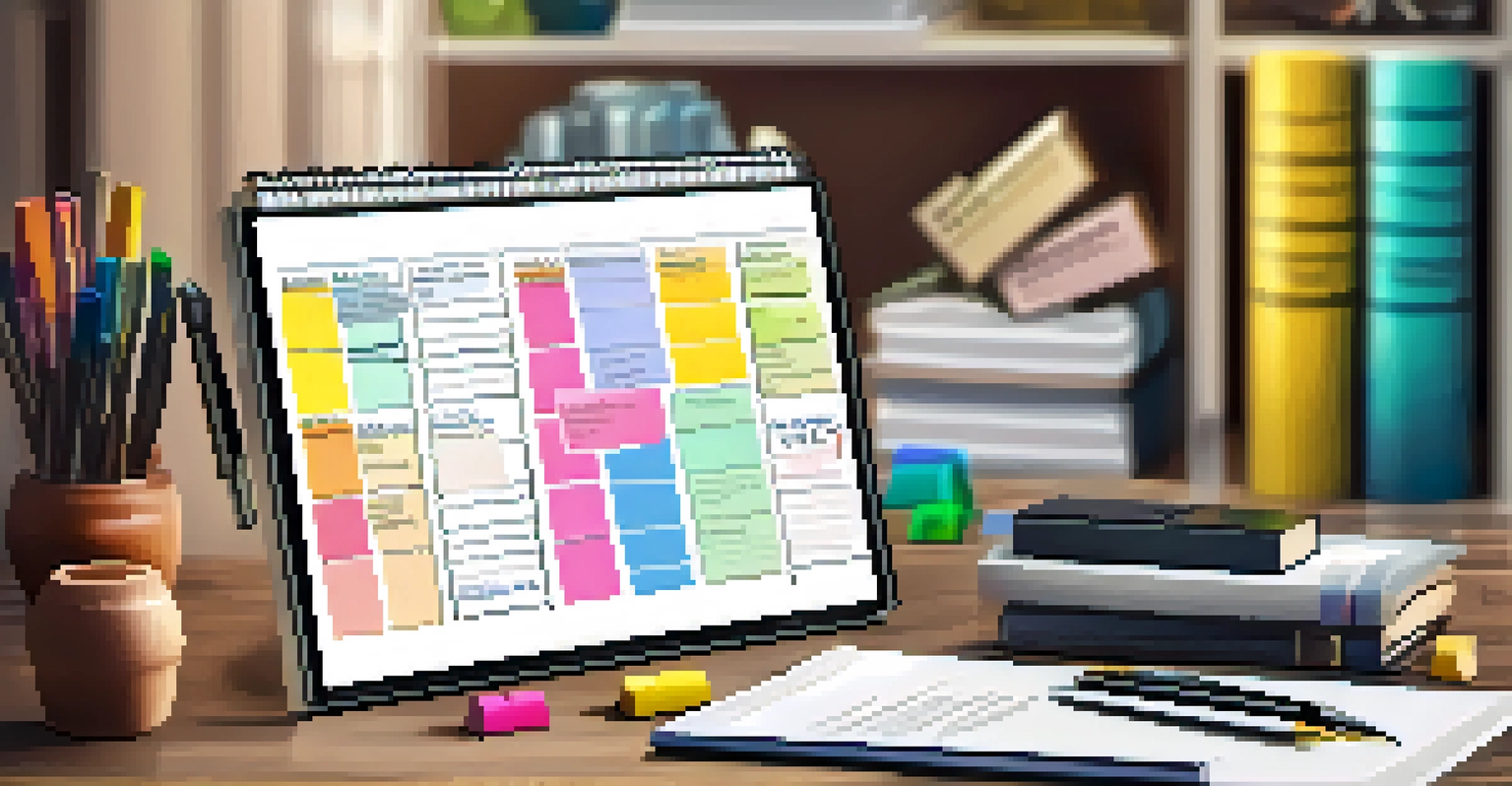How to Create a Personal Finance Plan for Long-Term Success

Understanding the Importance of a Personal Finance Plan
Creating a personal finance plan is like having a roadmap for your financial journey. It helps you identify your goals, whether they’re saving for a house, retirement, or a dream vacation. Without a plan, it’s easy to drift aimlessly, making decisions that may not align with your long-term objectives.
A budget is telling your money where to go instead of wondering where it went.
A well-structured plan not only gives you direction but also empowers you to take control of your finances. It provides clarity on where your money is going and helps you prioritize spending and saving. Much like a GPS, a finance plan can guide you back on track if you veer off course.
Ultimately, a finance plan is essential for achieving financial peace of mind. It reduces anxiety about money, as you’ll have a clear outline of what to do and when. By understanding the importance of planning, you set the stage for lasting financial success.
Setting Clear Financial Goals to Drive Your Plan
The first step in creating your personal finance plan is to set clear and achievable financial goals. Think of these goals as the destination on your financial roadmap. Whether you want to save for a rainy day, pay off debt, or invest for retirement, having specific targets makes it easier to stay focused.

When setting your goals, consider using the SMART criteria: Specific, Measurable, Achievable, Relevant, and Time-bound. For example, instead of saying, 'I want to save money,' specify, 'I want to save $5,000 for a vacation by next summer.' This clarity will help you monitor your progress more effectively.
Create a Personal Finance Plan
A personal finance plan serves as a roadmap for your financial journey, helping you set goals and maintain control over your money.
Remember, your goals can evolve over time, so it’s important to review and adjust them as needed. Life changes, and your financial aspirations might too. Keeping your goals flexible allows you to navigate unexpected events while still aiming for success.
Assessing Your Current Financial Situation
Before diving into your finance plan, it’s crucial to assess your current financial situation. This means taking stock of your income, expenses, debts, and savings. It’s akin to checking your gas tank before embarking on a long road trip; you need to know where you stand to plan effectively.
The way to get started is to quit talking and begin doing.
Create a detailed list of all your income sources and monthly expenses. This will help you identify patterns and areas where you can cut back if necessary. For instance, if you find that you’re spending a significant amount on dining out, you might decide to cook more at home to save money.
Additionally, understanding your debts is vital. List them out, noting interest rates and due dates. This assessment will give you a clear view of your financial landscape and help you make informed decisions moving forward.
Creating a Realistic Budget to Manage Your Finances
A budget is the backbone of your personal finance plan, allowing you to allocate your resources wisely. Think of it as your financial blueprint; it outlines how much money you need for essentials while leaving room for savings and discretionary spending. Without a budget, it’s easy to overspend and lose sight of your financial goals.
To create an effective budget, start by categorizing your expenses into fixed (like rent or mortgage) and variable (like groceries or entertainment). This will help you see where you can trim the fat. For example, if you notice that your entertainment budget is too high, consider hosting movie nights at home instead of going out.
Set Clear Financial Goals
Establishing specific, measurable financial goals provides direction and focus, making it easier to track your progress.
Finally, remember that a budget isn’t set in stone. Review it regularly to make adjustments as your financial situation changes. This flexibility will help you stay on track and ensure your budget continues to serve your financial goals.
Establishing an Emergency Fund for Unexpected Expenses
An emergency fund is your financial safety net, designed to cover unexpected expenses that life throws your way, such as medical bills or car repairs. Think of it as an insurance policy for your finances—when the unexpected happens, it can save you from falling into debt. Experts often recommend saving three to six months' worth of living expenses.
To build your emergency fund, start small. Aim to save a little each month until you reach your target. You might automate this process by setting up a direct deposit from your paycheck into a separate savings account. This makes saving effortless and ensures you're consistently building your fund.
Having an emergency fund not only protects you financially but also provides peace of mind. You'll feel more secure knowing you have a cushion to fall back on, allowing you to focus on your long-term financial goals without fear of unexpected disruptions.
Investing for the Future: Growing Your Wealth Over Time
Investing is a crucial component of any personal finance plan, as it helps your money grow over time. Think of it as planting a seed that, with proper care, can blossom into a fruitful tree. The earlier you start investing, the more time your money has to grow, thanks to the power of compound interest.
There are various investment options to consider, such as stocks, bonds, and mutual funds. Each has its own risk level and potential return, so it’s important to do your research and choose what aligns with your financial goals and risk tolerance. For example, if you’re saving for retirement, long-term investments like stocks may be a good fit.
Regularly Review Your Plan
Consistently reviewing and adjusting your finance plan ensures it remains effective and aligned with your evolving financial situation.
Don’t be intimidated by investing; start small and gradually increase your contributions as you become more comfortable. Consider speaking with a financial advisor for personalized advice tailored to your situation. Investing wisely can set you on a path to financial independence and security.
Reviewing and Adjusting Your Finance Plan Regularly
Creating a personal finance plan is just the beginning; regular reviews are essential to ensure it stays effective. Life is full of changes—job shifts, family additions, or even market fluctuations—so your plan should adapt to these changes. Think of it like maintaining a car; regular check-ups keep everything running smoothly.
Set a schedule to review your plan, whether it’s quarterly or biannually. During these reviews, assess your progress towards your goals, revisit your budget, and evaluate your investments. This is also a great opportunity to celebrate your achievements, no matter how small!

If you find that certain aspects of your plan aren’t working, don’t hesitate to make adjustments. Flexibility is key to long-term success, allowing you to stay aligned with your financial objectives. By continuously refining your plan, you can navigate life’s twists and turns with confidence.